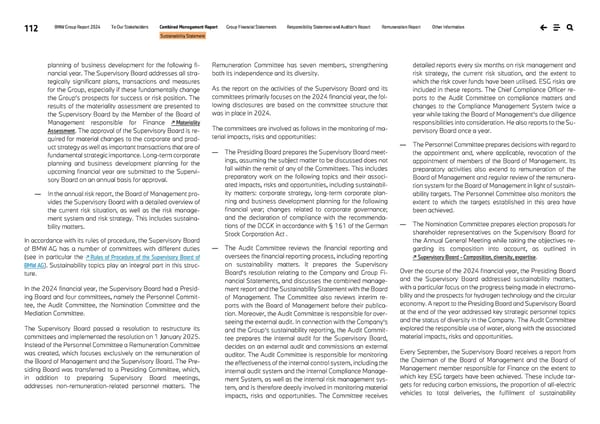112 BMW Group Report 2024 To Our Stakeholders Combined Management Report Group Financial Statements Responsibility Statement and Auditor’s Report Remuneration Report Other Information Sustainability Statement planning of business development for the following fi- nancial year. The Supervisory Board addresses all stra- tegically significant plans, transactions and measures for the Group, especially if these fundamentally change the Group’s prospects for success or risk position. The results of the materiality assessment are presented to the Supervisory Board by the Member of the Board of Management responsible for Finance ↗ Materiality Assessment. The approval of the Supervisory Board is re- quired for material changes to the corporate and prod- uct strategy as well as important transactions that are of fundamental strategic importance. Long-term corporate planning and business development planning for the upcoming financial year are submitted to the Supervi- sory Board on an annual basis for approval. — In the annual risk report, the Board of Management pro- vides the Supervisory Board with a detailed overview of the current risk situation, as well as the risk manage- ment system and risk strategy. This includes sustaina- bility matters. In accordance with its rules of procedure, the Supervisory Board of BMW AG has a number of committees with different duties (see in particular the ↗ Rules of Procedure of the Supervisory Board of BMW AG). Sustainability topics play an integral part in this struc- ture. In the 2024 financial year, the Supervisory Board had a Presid- ing Board and four committees, namely the Personnel Commit- tee, the Audit Committee, the Nomination Committee and the Mediation Committee. The Supervisory Board passed a resolution to restructure its committees and implemented the resolution on 1 January 2025. Instead of the Personnel Committee a Remuneration Committee was created, which focuses exclusively on the remuneration of the Board of Management and the Supervisory Board. The Pre- siding Board was transferred to a Presiding Committee, which, in addition to preparing Supervisory Board meetings, addresses non-remuneration-related personnel matters. The Remuneration Committee has seven members, strengthening both its independence and its diversity. As the report on the activities of the Supervisory Board and its committees primarily focuses on the 2024 financial year, the fol- lowing disclosures are based on the committee structure that was in place in 2024. The committees are involved as follows in the monitoring of ma- terial impacts, risks and opportunities: — The Presiding Board prepares the Supervisory Board meet- ings, assuming the subject matter to be discussed does not fall within the remit of any of the Committees. This includes preparatory work on the following topics and their associ- ated impacts, risks and opportunities, including sustainabil- ity matters: corporate strategy, long-term corporate plan- ning and business development planning for the following financial year; changes related to corporate governance; and the declaration of compliance with the recommenda- tions of the DCGK in accordance with § 161 of the German Stock Corporation Act . — The Audit Committee reviews the financial reporting and oversees the financial reporting process, including reporting on sustainability matters. It prepares the Supervisory Board’s resolution relating to the Company and Group Fi- nancial Statements, and discusses the combined manage- ment report and the Sustainability Statement with the Board of Management. The Committee also reviews interim re- ports with the Board of Management before their publica- tion. Moreover, the Audit Committee is responsible for over- seeing the external audit. In connection with the Company’s and the Group’s sustainability reporting, the Audit Commit- tee prepares the internal audit for the Supervisory Board, decides on an external audit and commissions an external auditor. The Audit Committee is responsible for monitoring the effectiveness of the internal control system, including the internal audit system and the internal Compliance Manage- ment System, as well as the internal risk management sys- tem, and is therefore deeply involved in monitoring material impacts, risks and opportunities. The Committee receives detailed reports every six months on risk management and risk strategy, the current risk situation, and the extent to which the risk cover funds have been utilised. ESG risks are included in these reports. The Chief Compliance Officer re- ports to the Audit Committee on compliance matters and changes to the Compliance Management System twice a year while taking the Board of Management’s due diligence responsibilities into consideration. He also reports to the Su- pervisory Board once a year. — The Personnel Committee prepares decisions with regard to the appointment and, where applicable, revocation of the appointment of members of the Board of Management. Its preparatory activities also extend to remuneration of the Board of Management and regular review of the remunera- tion system for the Board of Management in light of sustain- ability targets. The Personnel Committee also monitors the extent to which the targets established in this area have been achieved. — The Nomination Committee prepares election proposals for shareholder representatives on the Supervisory Board for the Annual General Meeting while taking the objectives re- garding its composition into account, as outlined in ↗ Supervisory Board - Composition, diversity, expertise. Over the course of the 2024 financial year, the Presiding Board and the Supervisory Board addressed sustainability matters, with a particular focus on the progress being made in electromo- bility and the prospects for hydrogen technology and the circular economy. A report to the Presiding Board and Supervisory Board at the end of the year addressed key strategic personnel topics and the status of diversity in the Company. The Audit Committee explored the responsible use of water, along with the associated material impacts, risks and opportunities. Every September, the Supervisory Board receives a report from the Chairman of the Board of Management and the Board of Management member responsible for Finance on the extent to which key ESG targets have been achieved. These include tar- gets for reducing carbon emissions, the proportion of all-electric vehicles to total deliveries, the fulfilment of sustainability
 BMW Group Report 2024 Page 111 Page 113
BMW Group Report 2024 Page 111 Page 113